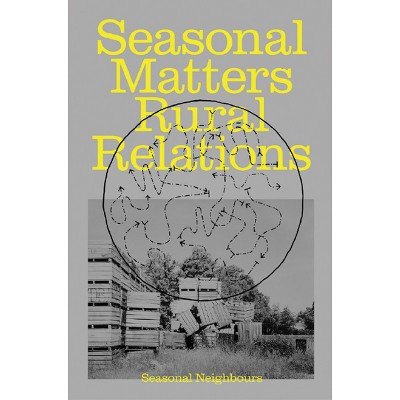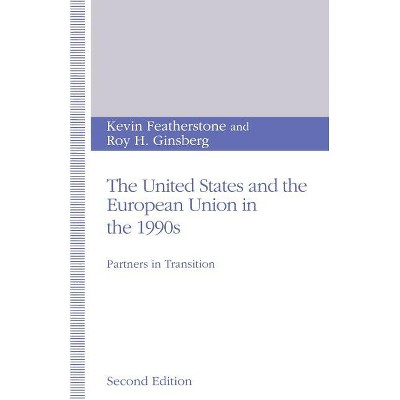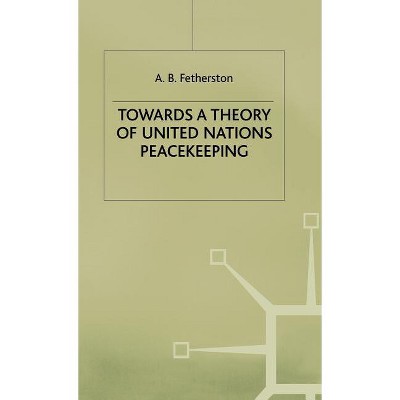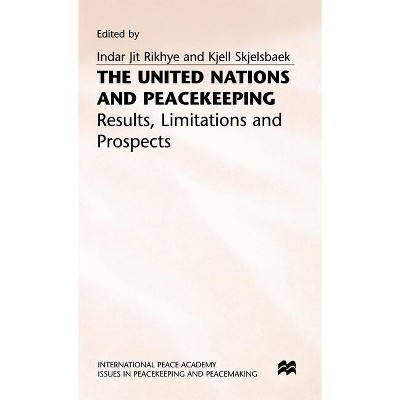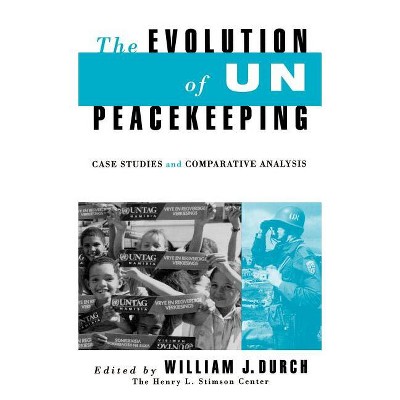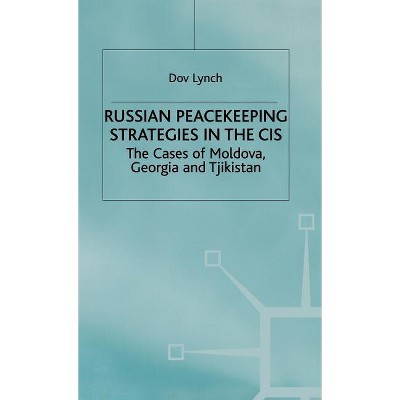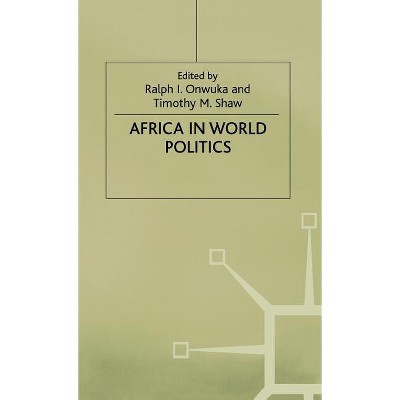Sponsored

Peacekeeping Fiascoes of the 1990s - by Frederick H Fleitz (Hardcover)
In Stock
Sponsored
About this item
Highlights
- Peacekeeping is a useful tool to manage international conflict and maintain truces, but it will only work in a narrow range of circumstances.
- About the Author: FREDERICK H. FLEITZ JR. is Special Assistant to the Under Secretary of State for Arms Control and International Security.
- 248 Pages
- Political Science, International Relations
Description
About the Book
Peacekeeping is a useful tool to manage international conflict and maintain truces, but it will only work in a narrow range of circumstances. Peacekeepers can order punitive airstrikes, depose elected leaders, destroy infrastructure, and enforce peace accords not drafted by the warring parties. They have overstepped their bounds, and peacekeeping is now often a euphemism for any multilateral military action. A CIA analyst who worked closely with Reagan, Bush, and Clinton administration officials on UN issues, Fleitz examines how peacekeeping works, the rash of peacekeeping failures since 1993, and whether peacekeeping can still play a role in U.S. foreign policy. It is a unique realist assessment destined to become the guide to this very important subject for U.S. policymakers, politicians, and students of international relations.
UN peacekeeping disasters in the 1990s occurred because world leaders failed to recognize the rules and precedents that allowed traditional peacekeeping to succeed during the Cold War. Although failed peacekeeping operations damaged the peacekeeping concept, it can still serve as a viable tool to promote international security and promote American interests abroad if used in the right circumstances. Carefully researched and supported by over two dozen maps, charts, and photos, Fleitz boldly challenges dozens of assumptions of the foreign policy establishment about the nature of the Cold War, post-Cold War peacekeeping, and 1990s peacekeeping deployments.
Book Synopsis
Peacekeeping is a useful tool to manage international conflict and maintain truces, but it will only work in a narrow range of circumstances. Peacekeepers can order punitive airstrikes, depose elected leaders, destroy infrastructure, and enforce peace accords not drafted by the warring parties. They have overstepped their bounds, and peacekeeping is now often a euphemism for any multilateral military action. A CIA analyst who worked closely with Reagan, Bush, and Clinton administration officials on UN issues, Fleitz examines how peacekeeping works, the rash of peacekeeping failures since 1993, and whether peacekeeping can still play a role in U.S. foreign policy. It is a unique realist assessment destined to become the guide to this very important subject for U.S. policymakers, politicians, and students of international relations.
UN peacekeeping disasters in the 1990s occurred because world leaders failed to recognize the rules and precedents that allowed traditional peacekeeping to succeed during the Cold War. Although failed peacekeeping operations damaged the peacekeeping concept, it can still serve as a viable tool to promote international security and promote American interests abroad if used in the right circumstances. Carefully researched and supported by over two dozen maps, charts, and photos, Fleitz boldly challenges dozens of assumptions of the foreign policy establishment about the nature of the Cold War, post-Cold War peacekeeping, and 1990s peacekeeping deployments.Review Quotes
"An indispensable contribution to the literature of conflict resolution and of UN studies. It provides, simultaneously, the record of UN peacekeeping--authoritative in every detail--and an informed critique of its successes, failures, and preconditions. A research necessity for all future UN students--and as pertinent as today's headlines."-Charles M. Lichenstein Distinguished Fellow The Heritage Foundation
"Fred Fleitz has hit the nail on the head. For anyone interested in learning the dirty details of United Nations peacekeeping operations, this is a must read. I congratulate Fred on an excellent project, and highly recommend this book to my friends and colleagues in the House of Representatives."-Representative Roscoe G. Bartlett (R-MD)
"Mr. Fleitz is possessed of impeccable credentials, having spent the past fifteen years successively as U.S. government analyst on UN peacekeeping, member of the CIA Balkan Task Force, and military analyst for Kosovo. The author contrasts traditional peacekeeping with what in fact has happened under United Nations' mismanagement and never revealed by the Clinton administration. The assessment by Mr. Fleitz is methodical and hard-hitting....The study by Mr. Fleitz provides much of the data which were withheld from the General Accounting Office. Thus, he has done a great service for the U.S. Congress as well as the attentive public, ' members of which will be shocked by what they read."-Richard F. Staar Senior Fellow, Hoover Institution
"This splendid analysis of peacekeeping in the 90s illuminates the problems encountered by the United States in its effort to utilize the new tool called peacekeeping' to achieve traditional military goals....Fred Fleitz has a unique understanding of what can and cannot be done through peacekeeping. He understands its potential and the obstacles to its effectiveness. The United States and the United Nations have much to learn from Fleitz's careful, useful, clearly written study."-Jeane J. Kirkpatrick Leavey Professor of Government Georgetown University
.,."delightfully blunt...Feitz offers some highly practical advice: Continue to use U.N. peacekeepers, but only along the lines of the traditional, limited model that used to work so well. Combine a return to that more modest approach with the adoption by Washington of a realistic foreign policy in which bienpensant internationalism is discarded, American interests are put first, and the isolationist temptation is avoided, and the results could be impressive. It won't be easy, but and intelligent foreign policy never is."-National Review
"For students of international relations who may be asking questions about why the international system seems so dysfunctional, notwithstanding efforts by intergovernmental organization to maintain peace and security, this book presents contentious answers.[P]resents a useful reminder of the distinctions between peacekeeping and other forms of military operation."-Political Science Quarterly
?...delightfully blunt...Feitz offers some highly practical advice: Continue to use U.N. peacekeepers, but only along the lines of the traditional, limited model that used to work so well. Combine a return to that more modest approach with the adoption by Washington of a realistic foreign policy in which bienpensant internationalism is discarded, American interests are put first, and the isolationist temptation is avoided, and the results could be impressive. It won't be easy, but and intelligent foreign policy never is.?-National Review
?[c]learly written, well researched, infused with commitment, bristling with trenchant characterizations, and offering reasonable solutions to pressing problems, the book will undoubtedly provide plenty of material to offend nearly everybody. In summary, Peacekeeping Fiascoes of the 1990s is indispensable to policy makers, well wishers and skeptics of the United Nations, and students of conflict resolution and international relations in general. pressing problems?-US Army War College Quarterly
?[t]he need to distinguish clearly between peacekeeping and peace enforcement, each requiring different approaches and capabilities, and the need to determine the appropriate circumstances when one or the other is justified, is essential. The book is an appropriate first stem towards both understanding that distinction and designing policies to meet the requirements for both that stipulate the role to be played by outside parties. It is, therefore, an excellent contribution to the literature of international organization and conflict management and of use to scholarly and policy communities.?-The International History Review
?For students of international relations who may be asking questions about why the international system seems so dysfunctional, notwithstanding efforts by intergovernmental organization to maintain peace and security, this book presents contentious answers.[P]resents a useful reminder of the distinctions between peacekeeping and other forms of military operation.?-Political Science Quarterly
"Ýc¨learly written, well researched, infused with commitment, bristling with trenchant characterizations, and offering reasonable solutions to pressing problems, the book will undoubtedly provide plenty of material to offend nearly everybody. In summary, Peacekeeping Fiascoes of the 1990s is indispensable to policy makers, well wishers and skeptics of the United Nations, and students of conflict resolution and international relations in general. pressing problems"-US Army War College Quarterly
"Ýt¨he need to distinguish clearly between peacekeeping and peace enforcement, each requiring different approaches and capabilities, and the need to determine the appropriate circumstances when one or the other is justified, is essential. The book is an appropriate first stem towards both understanding that distinction and designing policies to meet the requirements for both that stipulate the role to be played by outside parties. It is, therefore, an excellent contribution to the literature of international organization and conflict management and of use to scholarly and policy communities."-The International History Review
..."delightfully blunt...Feitz offers some highly practical advice: Continue to use U.N. peacekeepers, but only along the lines of the traditional, limited model that used to work so well. Combine a return to that more modest approach with the adoption by Washington of a realistic foreign policy in which bienpensant internationalism is discarded, American interests are put first, and the isolationist temptation is avoided, and the results could be impressive. It won't be easy, but and intelligent foreign policy never is."-National Review
"[c]learly written, well researched, infused with commitment, bristling with trenchant characterizations, and offering reasonable solutions to pressing problems, the book will undoubtedly provide plenty of material to offend nearly everybody. In summary, Peacekeeping Fiascoes of the 1990s is indispensable to policy makers, well wishers and skeptics of the United Nations, and students of conflict resolution and international relations in general. pressing problems"-US Army War College Quarterly
"[t]he need to distinguish clearly between peacekeeping and peace enforcement, each requiring different approaches and capabilities, and the need to determine the appropriate circumstances when one or the other is justified, is essential. The book is an appropriate first stem towards both understanding that distinction and designing policies to meet the requirements for both that stipulate the role to be played by outside parties. It is, therefore, an excellent contribution to the literature of international organization and conflict management and of use to scholarly and policy communities."-The International History Review
About the Author
FREDERICK H. FLEITZ JR. is Special Assistant to the Under Secretary of State for Arms Control and International Security. His previous positions include President of the Board of Directors with the National Collegiate Conference Association, nongovernmental organization representative for the UN, and analyst of United Nations and UN peacekeeping issues for the Central Intelligence Agency. The views expressed in this book are his alone and do not necessarily represent the views of the Department of State, the Central Intelligence Agency, or the U.S. Government.Shipping details
Return details
Frequently bought together

Trending Non-Fiction







